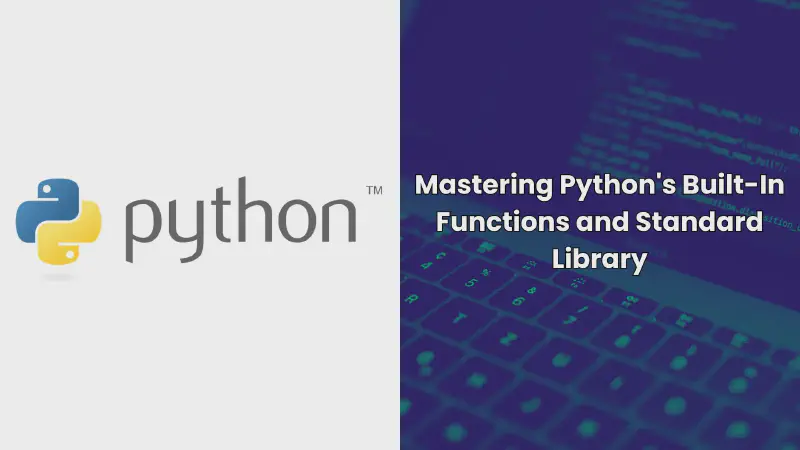Python is renowned for its simplicity and versatility, which is largely due to its extensive standard library and a rich set of built-in functions. These tools allow developers to write efficient, readable, and maintainable code.
In this article, we’ll dive deep into how you can leverage Python’s built-in functions and the Python Standard Library to enhance your programming skills and build powerful applications.
Understanding Python’s Built-In Functions
Python’s built-in functions are a collection of pre-defined functions that are always available in the Python environment. These functions perform a wide range of tasks, from basic operations like
|
|
to more complex ones like
|
|
and
|
|
.
Key Built-In Functions You Should Know
len(): Returns the length of an object.- Example:
len([1, 2, 3, 4])returns4.
- Example:
type(): Returns the type of an object.- Example:
type(42)returns ``.
- Example:
sorted(): Returns a new sorted list from the elements of any iterable.- Example:
sorted([3, 1, 4, 1, 5])returns[1, 1, 3, 4, 5].
- Example:
sum(): Returns the sum of all items in an iterable.- Example:
sum([1, 2, 3, 4])returns10.
- Example:
zip(): Aggregates elements from multiple iterables into tuples.- Example:
zip([1, 2], ['a', 'b'])returns[(1, 'a'), (2, 'b')].
- Example:
The Python Standard Library: A Treasure Trove of Tools
The Python Standard Library is a massive collection of modules and packages that come bundled with Python, providing tools for a variety of tasks. From file I/O and system calls to data serialization and web development, the standard library has it all.
Essential Python Standard Library Modules
osModule: Interacting with the Operating System- Key Functions:
os.getcwd(),os.listdir(),os.path.join() - Example:
os.listdir()returns a list of all files and directories in the current directory.
- Key Functions:
sysModule: System-Specific Parameters and Functions- Key Functions:
sys.argv,sys.exit(),sys.version - Example:
sys.argvreturns a list of command-line arguments passed to a Python script.
- Key Functions:
datetimeModule: Working with Dates and Times- Key Classes/Functions:
datetime.date,datetime.time,datetime.datetime - Example:
datetime.datetime.now()returns the current date and time.
- Key Classes/Functions:
jsonModule: JSON Encoding and Decoding- Key Functions:
json.dump(),json.load(),json.dumps() - Example:
json.dumps({'name': 'John', 'age': 30})returns'{"name": "John", "age": 30}'.
- Key Functions:
reModule: Regular Expressions- Key Functions:
re.match(),re.search(),re.findall() - Example:
re.findall(r'\d+', 'hello 123 world 456')returns['123', '456'].
- Key Functions:
Practical Applications of Built-In Functions and the Standard Library
Leveraging built-in functions and the standard library can significantly simplify your code and improve its performance. Let’s explore a few practical scenarios:
File Handling with os and open()
- Task: Reading all text files in a directory and counting the number of lines in each.
- Solution:
|
|
Data Serialization with json
- Task: Converting a Python dictionary into a JSON string and saving it to a file.
- Solution:
|
|
Regular Expressions with re
- Task: Extracting all email addresses from a string.
- Solution:
|
|
Best Practices for Using Built-In Functions and the Standard Library
- Know When to Use Built-In Functions: Built-in functions are optimized for performance. Whenever possible, use them instead of writing custom implementations.
- Explore the Standard Library: Familiarize yourself with the modules in the standard library. This can save you from reinventing the wheel.
- Stay Updated: Python is continually evolving, and so is its standard library. Keep an eye on updates and new modules that may simplify your tasks.
- Write Readable Code: While built-in functions and standard libraries offer powerful tools, always prioritize readability. Clear and simple code is often better than a complex one, even if it’s more efficient.
Conclusion
By mastering Python’s built-in functions and the standard library, you can write more efficient, readable, and maintainable code. Whether you’re a beginner or an experienced developer, these tools will help you solve a wide range of programming challenges more effectively. As you continue to explore Python, you’ll find that the standard library is a vast resource, waiting to be leveraged to its full potential.
